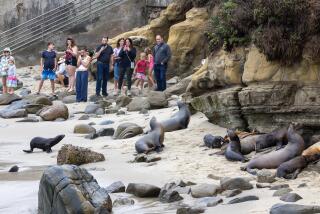First Batch of Shore Birds Is Returned to Wild : Rehabilitation: They were released at Point Mugu, more than 100 miles from Huntington Beach. But the decision to free the birds so quickly drew criticism.
- Share via
At a remote lagoon at Point Mugu Naval Air Station, Thursday started as another peaceful day in paradise.
Several pelicans glided across the water and on a nearby mud flat, a herd of harbor seals basked in the sun.
But the quiet was broken in mid-afternoon as a truck carrying cardboard boxes pulled to the waterline.
Inside its towel-lined boxes was precious cargo--15 shore birds, a mix of horned grebes, western grebes, Clark’s grebes, surf scoters and one coot. All were survivors of an environmental disaster--a major oil spill off Huntington Beach that so far has killed 214 birds and coated 368 others with deadly crude.
But Wednesday, on what officials expected to be the first of many trips to the lagoon, two federal biologists were returning these birds to the wild.
To be sure, the new location was more than 100 miles from the beaches where the oil-coated birds had been found. But federal officials had chosen the Point Mugu site because of its protected location and because the oil on Orange County’s beaches was too far away to do these birds harm.
When the brown boxes were opened, the birds took to the water as if they had always lived there, said several Point Mugu officials who witnessed their release. One by one, the birds fluttered into the air for a moment, then settled calmly into the lagoon.
“All of them looked fine, happy, except one, the coot. Its leg was a little slow,” said Mark Yenichek, a Navy photographer’s mate second class.
“There wasn’t much fanfare,” added Ron Dow, the air station’s environmental manager who also watched the release. But, he said, just as the two Fish and Wildlife service biologists were unloading the birds, a tour of schoolchildren arrived at the lagoon.
“The kids helped carry the boxes down,” Dow said. “And 30 kids just went nuts watching the birds take to the water.”
Twenty more shore birds are scheduled to be released at Point Mugu today, and more shore birds from Orange County are expected to be released every day for the next few weeks until all the birds rescued from the oil spill are gone, said Jay Holcomb, director of the nonprofit International Bird Rescue Center, which has set up a temporary bird cleaning station on Terminal Island in the Port of Los Angeles.
The decision to release the birds so quickly, just a week after the Feb. 7 spill, was questioned by Kimball Garrett, an ornithologist with the Los Angeles County Natural History Museum.
Quoting several ornithology texts, Garrett said it can take from eight days to several weeks for birds to restore insulating natural oil that is lost when crude oil is cleaned from their feathers. And he noted a recommendation by veterinarian Katharine Tottenham that “unless the bird can be cared for over a period of six months, it is generally kinder to destroy it.”
“Even with the most heroic of efforts,” most of the birds that are returned to the wild will probably die, Garrett said. “The amount of money and effort spent in rehabilitating (birds)” would probably be better spent on preventing oil spills, he said.
But Rescue Center director Holcomb said all birds are carefully observed before they are released.
“We don’t release them until they can float and dive” in 3-foot-deep plastic pools that have been set up at the Terminal Island facility. Also, Holcomb said, a veterinarian takes blood samples from oiled birds, checking them for anemia, a common toxic effect associated with ingestion of oil.
Holcomb conceded that many of the birds may die after they are released because they have ingested so much oil.
“We expect mortality,” he said. “But my feeling is that the fact that we save any is a miracle.”
More to Read
Sign up for Essential California
The most important California stories and recommendations in your inbox every morning.
You may occasionally receive promotional content from the Los Angeles Times.










